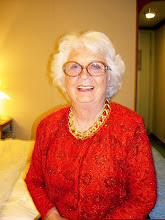Mama had very little contact with anyone in her family. Her sister, Myrtle, married later than Mama, to a very nice man, Leonard Lee. He was sort of quiet, and I thought he was very handsome. Aunt Myrtle was a character. We saw more of her than we did their brother Durwood, who inherited the farm and house. She lived in town, and it was a big treat to go to her house. I remember the first time she invited me to spend the weekend. I took my first bath in a tub, and made my first phone call - to my favorite teacher. Her daughter was ten years younger then I, and she was pretty, like the Robinsons. I envied that, hated my red hair and freckles.
Uncle Durwood came to visit about once a year. Daddy usually took off somewhere when he came. My mother accepted the fact that she would never get anything for her years of hard work on her father's farm, but Daddy grumbled about it. After Miss Helen died, and Mama could do as she wished with the house, Uncle Durwood asked her if he could do anything for her. I was in college, and I came home one weekend to find Uncle Durwood, a skilled carpenter, tearing out a wall to make Mama a proper living room. She had never had a nice living room with pretty furniture. Miss Helen had insisted on having the entire floor covered with scatter rugs, and they were the first to go. Uncle Durwood didn't charge her a penny.
Before Aunt Myrtle was married she came to visit us in the big old house in Craven County. She brought us a box of ready to eat cereal. I thought I had never eaten anything so good. Corn flakes soon became popular, but they were too expensive for us.
Mama always made a big breakfast, ham, if we had it, grits and gravy, scrambled eggs, and the best biscuits in the world. During the depression we sometimes had no meat or eggs, if the hens were not laying, but we always had biscuits, and she would make Hoover gravy, by browning flour in a dry pan, and adding water to make a thick brown liquid that looked like gravy, but had very little taste. If there were any left over black-eyed peas, we could put some on a split biscuit, and cover the whole thing with the gravy. Not bad!
We always had to take our lunch to school. If we had ham, a piece in a biscuit was good, but the kids whose family had money brought baloney sandwiches made with loaf bread store bought and pre-sliced. Oh, how I wished I could have tasted it. I ate mine in a corner so nobody could see what I had. In cold weather Mama always put a small baked sweet potato in each of my pockets to keep my hands warm. That made a nice treat. When I was in college,I was invited to a wedding reception where they served little biscuits stuffed with sliced ham. I shall never forget how it made me feel to realize I had been eating party food for lunch in grade school!
I always felt that everybody in the class was on a higher social level. They wore store bought clothes. In third grade my winter coat was made of flour sacks dyed orange, (after it was made, as we had no orange thread). Orange was not a popular color. Each weekend she washed it by hand, starched it and ironed it for me to wear on Monday. The sacks were heavy and had a label painted on, but Clorox had been invented, and she was so excited to be able to bleach out the writing. Now a coat like that, in that color, would be high fashion.
One day at school a pretty girl in high school came to me and told me she was Mama's sister. Our school was first through twelfth. She said she had just learned that she was adopted. Mama had never told me about the baby she took to Aunt Mary Harper, who raised her as her own. They were afraid she would be traumatized, if she learned her father had given her away. I suppose they did it very tactfully, because she said she was happy to know she was my aunt, and asked me to tell Mama she wanted to take the school bus to visit her. Mama was so happy to finally be able to recognize her as a sister. She was very beautiful with long black curly hair. We saw her often until she married a Marine stationed at Camp LeJeune, a Polish boy, Ed Tagai, from Wisconsin. She stayed with his family there while he faught in the Pacific, had a girl and boy when he returned, and died young of cancer. I wish I had some contact.
Tuesday, May 12, 2009
Subscribe to:
Post Comments (Atom)

No comments:
Post a Comment